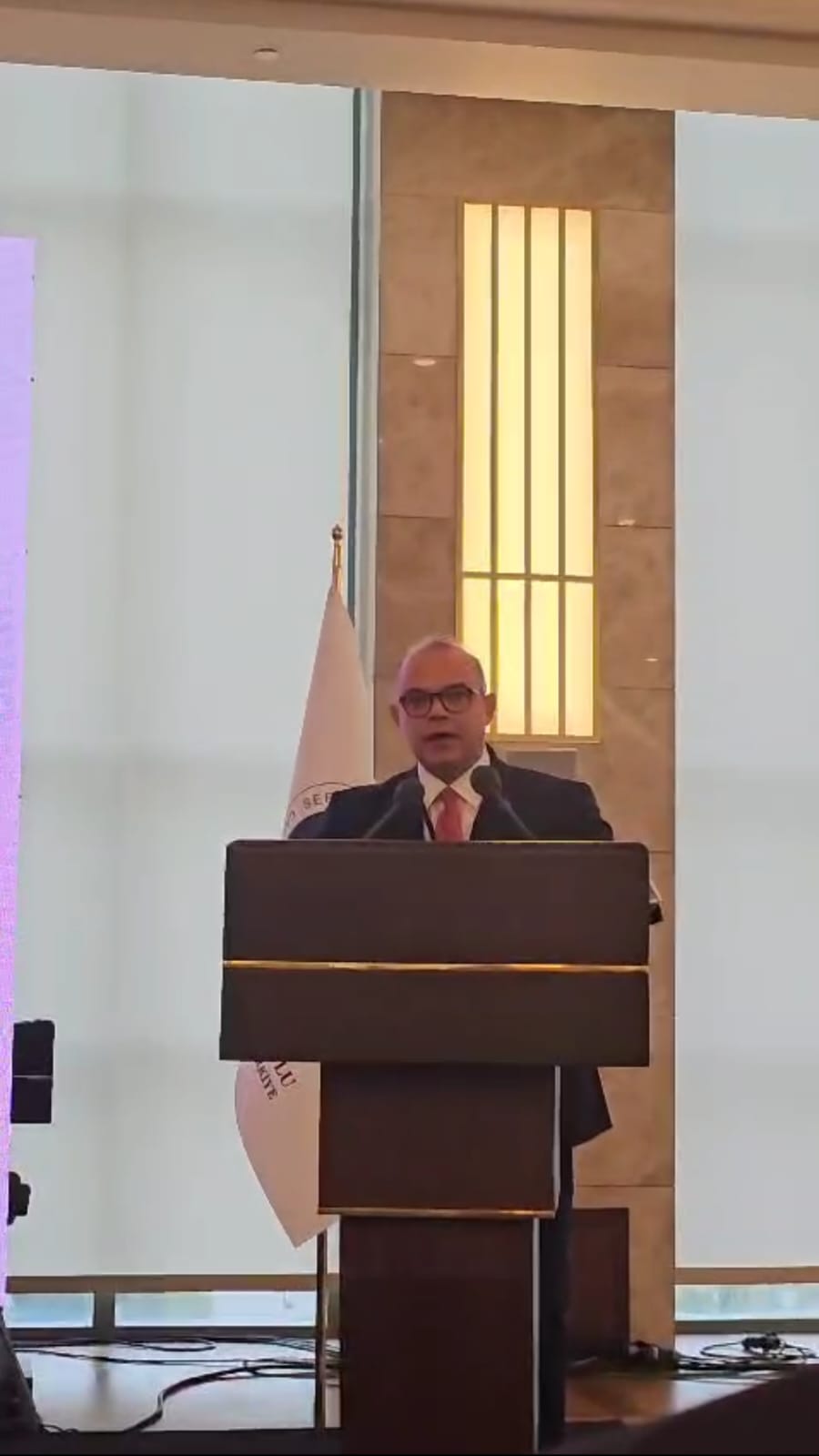- The conference focuses on financial inclusion, cryptocurrency regulation, digital asset and sustainability reporting.
- The meetings serve as a platform for exchanging ideas and experiences to enhance the role of Exchanges in developing economies and address emerging trends.
Dr. Mohamed Farid, FRA Chairman and Vice Chair of the IOSCO Board:
- Digital transformation and financial literacy are essential for achieving financial inclusion. Combined efforts can accelerate progress.
- Artificial intelligence offers immense potential to drive development across various sectors through data analysis and evidence-based decision-making.
- Flexibility, adaptability and continuous regulatory improvement are essential for enhancing market competitiveness and attracting investment.
Dr. Mohamed Farid, FRA Chairman delivered a keynote speech at the GEMC Annual Meeting and Public Conference hosted by Capital Markets Board of Türkiye (CMB) in Ankara. The conference, which continues until the end of this week, brings together representatives of all capital market regulators worldwide. Dr. Farid is participating as Chairman of the Financial Regulatory Authority, Vice Chair of the IOSCO Board and GEMC Chairman.
The Annual Meeting and Public Conference serve as a vital forum for discussing significant issues and exchanging expertise to enhance the role of capital markets in supporting various economies.
Key topics of discussion include efforts to achieve financial inclusion, increase financial literacy and address the evolving landscape of regulating cryptocurrency and digital asset. Sustainability reporting also emerges as a prominent topic.
Dr. Mohamed Farid expressed gratitude to the Capital Markets Board of Türkiye (CMB) for their excellent organization and warm hospitality. He highlighted that the conference would feature a series of seminars, workshops and bilateral meetings focused on crucial issues for the development and growth of capital markets and their role in economic development.
Dr. Farid emphasized the pivotal role of technology in fintech and digitalization. He explained that these aspects are crucial for achieving financial inclusion by enabling a wider range of beneficiaries to access and utilize the diverse financial instruments available in the market. Without technology, he asserted, it would be impossible to achieve financial inclusion or provide adequate access to financial services, ranging from private sector financing to exchange-traded instruments and technology-based tools.
Dr. Farid further emphasized that the adoption of fintech and the digitalization of non-bank financial transactions empowers the non-bank financial sector to drive financial inclusion and digital transformation. He highlighted that fintech serves as a key catalyst in facilitating access to non-bank financial services for all segments of society.
FRA Chairman detailed the comprehensive efforts undertaken by the Authority to shape the regulatory landscape for the non-bank financial sector. These efforts were instrumental in driving digital transformation, encompassing the development of laws and regulations governing the use of fintech. The Authority also established a robust framework for licensing and supervising entities engaged in non-bank financial activities, addressing key aspects such as technological infrastructure and cybersecurity. Notably, the decree on digital identity marked a significant advancement, providing a clear roadmap for the adoption of financial technology and ensuring compliance with regulatory standards. This pioneering decree set a precedent for financial sector regulators, establishing a comprehensive framework for eKYC (electronic Know Your Customer).
However, FRA Chairman stressed that this rapid technological advancement presents significant challenges for regulatory authorities. He pointed out the necessity for market regulatory bodies to collect data and utilize artificial intelligence to analyze it and inform regulatory actions. He explained that traditional methods of market regulation are no longer adequate given the growing number of market participants and the associated limitations of traditional, less frequent data collection.
Dr. Farid emphasized the need for regulatory authorities to adapt their approach to effectively regulate evolving markets. This requires flexibility, agility and a willingness to embrace new ideas, markets and products. Moreover, the development of modern regulatory frameworks is essential. Without these changes, regulatory authorities may not be able to achieve the critical goals of financial inclusion and mobilizing savings for productive investment, which increasingly depend on innovative products that leverage digitization and technology.
Moreover, FRA Chairman emphasized the crucial importance of sustainability reporting, given the growing recognition of Environmental, Social, and Governance (ESG) factors by the market. He highlighted that sustainability offers a significant opportunity for emerging markets to attract investment and is essential for global efforts to combat climate change. He stressed the need for simplified sustainability approaches, particularly for SMEs, emphasizing that sustainability is not solely a concern for large corporations or the financial sector. He further emphasized the importance of both listed and unlisted companies adhering to sustainability standards.
Dr. Mohamed Farid also addressed the importance of cooperation between the (IOSCO) and the GEMC with entities such as registrars to assist companies operating in all sectors in adhering to sustainability and committing to issuing carbon emissions disclosures.
Also, Dr. Mohamed Farid emphasized the importance of the ISSB’s new sustainability disclosure standards, IFRS S1 and S2, and the need for their integration into IFRS. He highlighted the challenges of applying these standards to unlisted companies, particularly given the decline in listings and the varying regulatory frameworks governing listed and unlisted companies, despite the significant environmental and social implications.
Last modified: December 23, 2024
